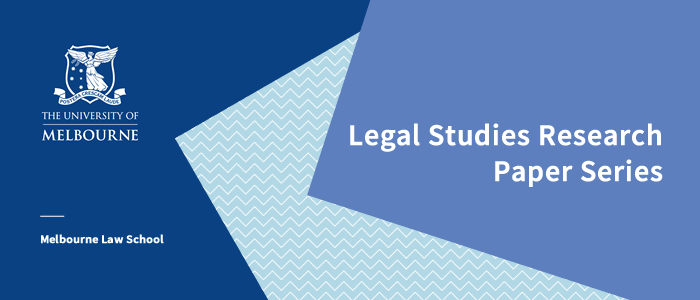Volume 23. No. 4
Wednesday, 24 June 2021

Melbourne Law School published Volume 23 Number 4 of the University of Melbourne Law School Legal Studies Research Paper Series on SSRN.
This issue includes the following articles:
Robin Room and Paula O'Brien
Alcohol Marketing and Social Media: A Challenge for Public Health Control (939)
In public health terms, alcohol is no ordinary commodity. It accounts not only for a substantial portion of the world’s burden of disease but also for much social harm. Because of this, a majority of countries have some kind of restrictions beyond general rules for foodstuffs on alcohol’s availability and promotion. On the international level, however, restrictions in the interests of public health are minimal. On the contrary, indeed, international and regional trade agreements are increasingly restricting what national governments can do to control the alcohol market.
Kimberlee G. Weatherall and Rebecca Giblin
Inoculating Law Schools Against Bad Metrics (940)
Law schools and legal scholars are not immune to the expanding use of quantitative metrics to assess the research of universities and of scholars working within universities. Metrics include grant and research income, the number of articles produced in journals on ranked lists, and citations (by scholars, and perhaps courts). The use of metrics also threatens to expand to measure other kinds of desired activity, with various metrics suggested to measure the impact of research beyond scholarly circles, and even more amorphous qualities such as leadership and mentoring.
Tarunabh Khaitan
Balancing Accountability and Effectiveness: A Case for Moderated Parliamentarism (941)
In this article, I bring two key issues in constitutional studies — institutional regime type and electoral system choice — in conversation with each other, and examine their interaction through a normative framework concerning the role that constitutions ought to play in shaping their party systems. The main goal is to offer a theoretical defense (ceteris paribus) of moderated parliamentarism — as superior to its alternatives such as presidentialism, semi-presidentialism, and other forms of parliamentarism.
Andrew Higgin and Inbar Levy
What the Fair Minded Observer Really Thinks About Judicial Impartiality (942)
This article presents the results of an empirical study designed to assess the degree of convergence and divergence between public opinion and the fictional Fair Minded Observer (‘FMO’) used to determine whether a judge ought to be disqualified on the grounds of possible bias. As part of the test for apparent bias, judges have to imagine whether an FMO would see a risk of bias on the part of the judge. Although the courts have never definitively stated whether the FMO is meant to represent an ideal or average member of the public, to the extent that the FMO is partly meant to reflect public perception, the obvious weakness in the test is that no one has tested public attitudes to the risk of judicial bias specifically.
Adrienne Stone and Lael K. Weis
Positive and Negative Constitutionalism and the Limits of Universalism: A Review Essay (943)
In The Principles of Constitutionalism, Nicholas Barber provides a sophisticated yet highly readable introduction to fundamental constitutional principles. At the same time, Barber seeks to reorient constitutional theory scholarship away from a mistaken ‘negative’ understanding of constitutionalism towards a ‘positive’ understanding. This essay examines that argument. We suggest that the idea of ‘positive constitutionalism’ has a weaker and a stronger sense. In its weak form, the argument calls for greater attention to what constitutions enable as well as what they restrict and thus serves as a welcome reminder of the full potential of constitutional principles. However, it cannot be regarded as the correction of a widespread mistake. In its strong form, the argument calls for greater recognition that the state’s essential function lies in advancing the ‘well-being’ of its members. Although this does amount to a significant reorientation, it weakens the theory’s claim to universalism. These tensions indicate limitations to efforts to construct general theories of constitutionalism.
William Partlett
Kyrgyzstan's 2021 Constitution: A Brief Comparative and Historical Analysis (944)
This short article will begin the process of placing Kyrgyzstan’s new Constitution (adopted
on 10 April 2021) in comparative and historical perspective. It will argue that the most important
changes are structural and move Kyrgyzstan away from a checks-and-balances system of semipresidentialism toward a form of presidentialism that is close to the authoritarian-style “crownpresidentialism” in the post-Soviet Eurasian space. Although Kyrgyzstan’s new 2021 Constitution does not fully embrace a system of crown-presidentialism, it does, from a historical perspective, return Kyrgyzstan to a system of strong presidential power and therefore is a return to its tradition of executive centralism.